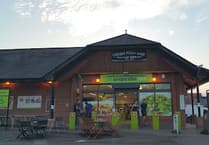THE public gallery at the Forest Council erupted with applause last week as controversial plans to build 375 homes, a business park and a new school in Newent were rejected.
Robert Hitchins Ltd was refused permission to develop almost 60 acres of agricultural land south of Gloucester Street.
The council rejected the scheme which included a first form entry primary school including nursery, up to 83,958.5 sq ft of employment land and a centre which could have had shops, cafes and a hot food takeaway.
More than 2,500 people signed a petition against the proposals and many marched in protest last year.
Residents raised concerns that the town’s already struggling sewage infrastructure would not be able to cope with the extra demand.
Others feared the new estate, which could have housed up to 1,000 people, would have turned the market town into “a dormitory for Gloucester with no identity”.
The council issued a notice last month saying the scheme did not comply with the Local Plan.
And officers recommended refusal as most of the development site lies outside the town’s settlement boundary, and it amounted to unsustainable development in the countryside.
The site included some of the best and most versatile agricultural land in the UK, and the proposal failed to show it could be carried out without harming protected species and habitats, said council planners.
Officers also said there was not enough information about the impact on traffic, and whether noise would affect residents.
They also pointed out that there was no provision for affordable housing, play parks, sports pitches nor a contribution to health services, policing, education and libraries.
Newent Benefice Rector Simon Mason spoke against the proposals at the development management committee meeting, saying the community was already suffering the effect of new housing and any more would “compound the problem”.
“Our infrastructure is already past breaking point at capacity,” he said. “We are affected now and would be more so.”
He also spoke of the loss of unique habitats and some of the best agricultural land in the county if the estate were built.
Cllr Joshua Robertson, on behalf of Newent Town Council, said they supported housing growth matched with investment in services, employment and an enhanced town centre, but were concerned housing was being proposed without improvements to local services.
“Newent as a whole still lacks the investment indicated in current and previous local plan strategies,” he said.
Ward councillor Gill Moseley (LD, Newent and Taynton) said Newent needed a pause “in relentless development which has enlarged the town dramatically”.
“If more expansion is to come, we need some breathing space,” she said. “Importantly to encourage economic growth to stop Newent becoming even more of a commuter town than it is already.”
And fellow ward councillor Julia Gooch (LD, Newent and Taynton) questioned why land of such high agricultural land was allocated for development in the upcoming local plan.
The housing would be a burden on local health services and infrastructure, she added.
Consultants working on the scheme previously said the new estate would provide a range of one to five bedroom homes
And they believed the proposals demonstrated that a high quality, responsive and sustainable development was achievable and deliverable for land south east of Newent.
But Councillor Ian Whitburn (Ind Coleford) labelled it an “awful application for the people of Newent”.
Cllr Simon Phelps (Ind, Westbury-on-Severn) echoed concerns over the potential loss of some of the county’s best farmland.
The committee voted unanimously to reject the scheme, with the public gallery erupting with applause as the decision was announced by chairman Dave Wheeler (G, Newland and Sling).




Comments
This article has no comments yet. Be the first to leave a comment.